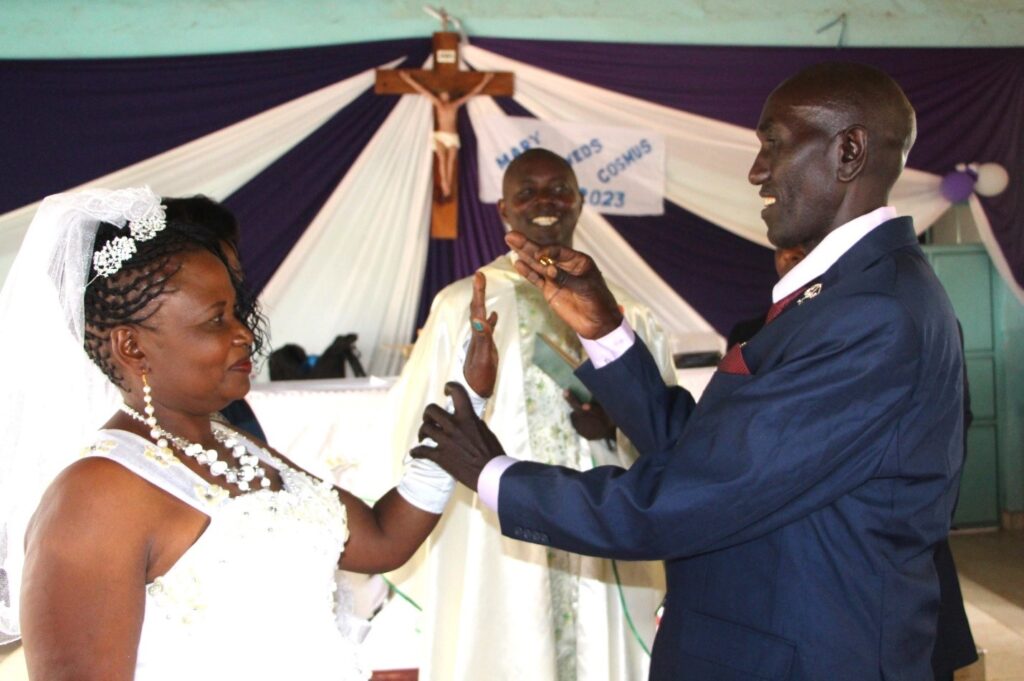As a youngster in Kenya, Mary Wambua was different. Children stayed away from her.
“When my friends were going to school and playing together—I was on my own. They said I smelled and didn’t want to get close to me,” says Mary Wambua, 48.

Mary had a fistula—an abnormal passage between the bladder and vagina that caused her to leak urine constantly. She remembers her childhood in school as one of loneliness, filled with shame and doubt.
When the schoolteachers asked me to stay away, my father spoke to the education officers to let me stay in school. I tried to study but when my classmates made fun of me, I asked my parents to [let me] drop out of school.”
Mary Wambua
Determined to help their daughter, Mary’s parents sought medical treatment at a hospital. She received a total of four surgeries, which were not successful, and she continued to leak urine. Then, they turned to traditional methods. This didn’t work. Mary needed a respite—and a refuge. She went to live with her elder brother in Nairobi city and there met her husband, Cosmas Wambua.
“I loved her. I asked her to be my wife and she didn’t understand. I told Mary that her problems would be our secret—no one knew, not even my family members,” says Cosmas, 49.
They got married and had two children. But Mary still battled with incontinence. This affected her socially. She avoided going to church, attending family functions and getting a job. Mary stayed indoors and away from people as the smell of urine drove everyone away. Cosmas was the sole wage earner for this family. But in 2017 when the company he worked for downsized its operations, Cosmas lost his job. He moved his family back to the village.
Then in early 2023, Mary heard a radio ad about a program to treat women with fistula. Jhpiego, through The Obstetric Fistula project, funded by Johnson & Johnson, at Makueni Hospital, offered surgical repairs for women with fistula. Mary went to the hospital early the next day and was admitted for repair.
Her life hasn’t been the same since.
“When Mary reported to the hospital, she could barely express herself and was very brief in her responses to questions. With the help of an expert fistula surgeon, Dr. Hilary Mabeya, Mary had a successful surgery. Due to the complexity of the surgery, the team felt she would probably require a repeat surgery but, to our surprise, she became continent,” says Dr. Doris Mbithi, obstetrician-gynecologist surgeon in Makueni County Referral Hospital.
“She followed all of her post-repair instructions and clinics.”
Mary cannot hide her joy whenever she comes for a follow-up appointment and always makes sure to pass by the fistula ward to encourage the other patients.
I can’t believe it! I wake up and the bed is not wet.”
Mary Wambua

A new chapter in Mary and Cosmas’ lives excited them so they decided to solemnize their marriage. “My favorite moment was exchanging the vows—a lifetime commitment to walk together and support each other.” Mary recalls the couple’s recommitment ceremony on November 4.
In Kenya, an estimated 24,000 women are living with obstetric fistula, with around 3,000 new cases every year. Many women are unable to access fistula repair services. Of the nearly 2,500 women who do seek care, only around 730 (29%) are surgically treated each year due to lack of surgical capacity, resulting in an intractable surgical backlog of obstetric fistula cases.
A collaborative effort led by Jhpiego in conjunction with the county government of Makueni and the national Ministry of Health initiated the obstetric fistula project. A multi-disciplinary approach was used to identify and train the fistula care team comprising a fistula surgeon, nurses, anesthetists, a physiotherapist, a counseling psychologist and a nutritionist. To date, the fistula care team has performed repairs for 40 women, giving them the chance to reclaim their health and dignity.
“The aim of the project is to build capacity, address the surgical backlog and establish a fistula center to improve access to medical services. We are working to foster safe, quality, respectful care and ensure successful rehabilitation and reintegration following repair,” says Mary Muthengi, a technical officer with Jhpiego in Kenya. “After leaking and living a life of isolation for more than 40 years, Mary is now set to make a fresh start in her life.”

Lisa Noguchi, Jhpiego’s Director of Maternal and Newborn Health, reviewed this story.
Joan Nduta is Jhpiego’s Senior Communications Manager, Africa Region. Photos by Pius Mukusya Maundu.



